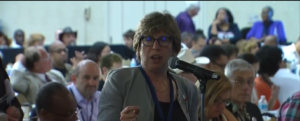
Last week, presumptive Democratic presidential nominee Hillary Clinton made waves with a brief nod to charter schools when she addressed the nation’s largest teachers union. The thrust of her comments largely jibed with a draft Democratic Party platform that saw some changes this week in Orlando — changes sought by anti-charter activists.
The revised version still includes support for charter schools as a concept. But it clearly proscribes their role in public education, opposing charter school growth that would “replace or destabilize” existing, district-run schools.
Democrats are also committed to providing parents with high-quality public school options and expanding these options for low-income youth. We support democratically governed great neighborhood public schools and high-quality public charter schools, and we will help them disseminate best practices to other school leaders and educators. Democrats oppose for-profit charter schools focused on making a profit off of public resources. We believe that high quality public charter schools should provide options for parents, but should not replace or destabilize traditional public schools. Charter schools must reflect their communities, and thus must accept and retain proportionate numbers of students of color, students with disabilities and English Language Learners in relation to their neighborhood public schools. We support increased transparency and accountability for all charter schools.
A video from the party’s platform committee meeting this past weekend in Orlando has made the rounds among charter critics. In it, activist Chuck Pascal praised American Federation of Teachers President Randi Weingarten for helping forge agreement with the Clinton campaign.
“We also want to make it clear that, while we understand that charters’ original purpose was to be innovative and experimental and small, what we have now is not that,” he said.
Party platforms tend to be obscure documents. But the proposed change, symbolic though it may ultimately be, has charter critics crowing. In a statement, Democrats for Education Reform President Shavar Jeffries said that, alongside other changes sought by the anti-standardized testing opt-out movement, the new proposal represents a departure from President Barack Obama’s legacy.
What happened in Orlando is little more than a bait and switch, one we are eager to fix, and which we hope is unreflective of Hillary Clinton’s priorities, as she has repeatedly supported standards and accountability and high-performing charter schools. President Obama has made clear that the best way to strengthen our system is not just with more resources, but reforms that ensure our children are progressing. Our Party’s platform should build upon that legacy.”
Before the committee approved the change, a fired-up Weingarten praised it as a “unity” proposal.
“We’ve said in this amendment that there is a place for charter schools — public charter schools — but we have also said that we can’t have what is happening in Detroit right now, where entities like the DeVos Family and the Koch Brothers are trying to use charters to kill off public schools,” she said.
The Democrats’ divide on education reform is real. Will it be on display when the party convenes in Philadelphia later this month?



[…] report is timely, given the recent battle over testing and charter schools in the Democratic Party platform, set to be finalized later this month in […]